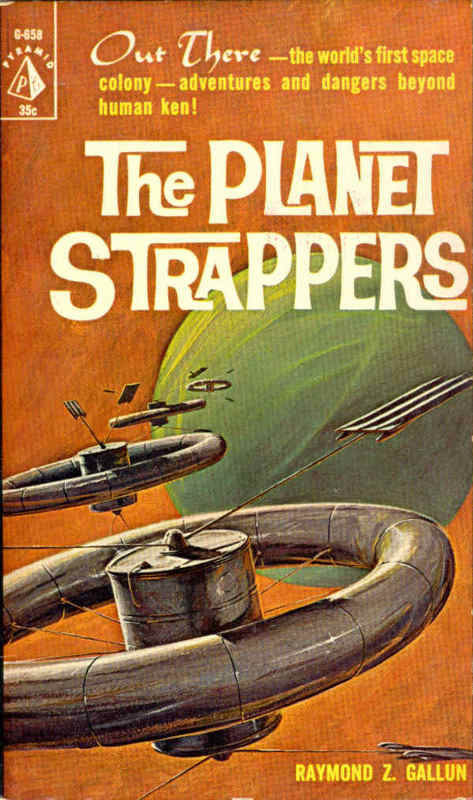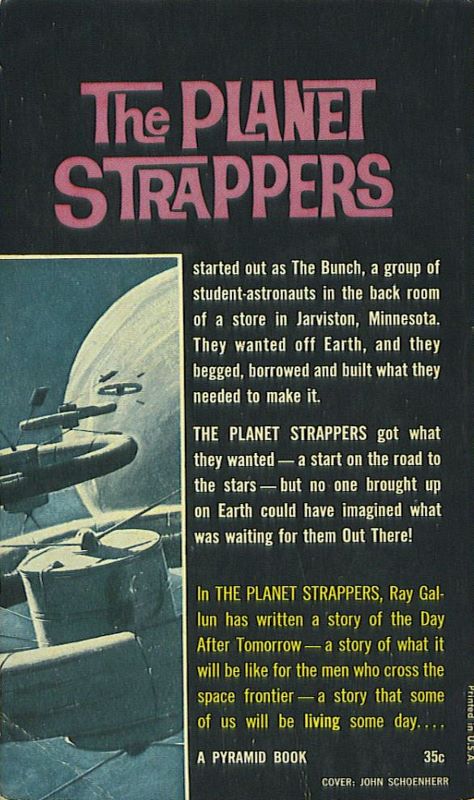
by Gideon Marcus
The nice thing about writing reviews for an immediately published medium, like a newspaper or a daily column, is the currency of the information you convey. Most reviewers get their books just before release from the publishers, and by the time their reviews are in print, their subjects are several months old. At Galactic Journey, you can be guaranteed a presentation of the very newest material.

Ironically, my offering for you this time around is Raymond Z. Gallun's The Planet Strappers, which while a brand new novel, reads like something written several decades ago. I'd gotten used to the out there stuff by Sturgeon and Farmer and Henderson, so it was a little jarring to find something so old-fashioned. But it makes sense: like the legendary "Doc" Smith, Gallun is a grizzled veteran of the 20s and 30s pulps. In fact, he hardly turned out a thing in the last decade.
Strappers is the story of The Bunch, a gang of young space enthusiasts from Jarviston, Minnesota who live some time in the mid-distance future. Their dream is to save enough dough to put together the kit needed to become space colonists: inflatable plastic habitats, "bubbs," that can be spun for gravity; ionic engines with weak but constant thrust, nuclear batteries; food, water, and air.
The Bunch are a diverse group. There's the Mexican, Miguel Ramos. The sole girl, Eileen Sands. The colored kid, Mitch Storey. The disabled fellow, "Gimp" Hines. The mathematically challenged "Two-and-two" Baines. To Gallun's credit, he does a good job of giving each of them character beyond their signature features. In fact, if there is any message of Strappers, it is that space is a level playing field, and that cultural distinctions are meaningless there.
Our viewpoint is Frank Nelsen, perhaps the smartest of The Bunch (and probably, though never specifically, a White man). We follow him through the creation of his colony kit and into space where he travels to most corners of the inner Solar System, encountering adventure, tragedy, and ultimately, happiness. It's a strange outline of a saga with a few fleshed out bits but with most being told in shorthand. Nelson's journey could easily have filled a book series (a la Danny Dunn or Lucky Starr). Instead, Gallun pares the tale down to its bare minimum.
As a result, rather than any of the sparsely portrayed players, the setting ends up being the real star of Strappers. We get a lot of technical exposition regarding the space-based economy as well as some solar-political background. The main polities seem to be The Free World and the statist Toves. The asteroids are a wild, woolly place constantly under threat by space-suited brigands. We are treated to loving descriptions of the "Archies," the ubiquitous space-suits that are practically single-person spaceships.
Gallun shows us a decidedly archaic view of the solar system with planets that don't conform with our latest scientific knowledge. For instance: Venus is uninhabitable, but not boiling. Mars' air is about a tenth as thick as Earth's (this may be true, but this assumes the existence of nitrogen in the Red Planet's atmosphere, which can't be directly detected). The Moon has a thin atmosphere, about 1/20,000th that of the Earth, as well as a few hardy plants clinging to volcanic vents. This is highly unlikely — virtually all sources I've consulted say that the Moon's atmosphere, such as there is, isn't much different from the hard vacuum of space.
Strappers features remainders of the Burroughsian belief that the outer planets were created earlier, cooled sooner, developed sentient life before ours. In fact, the asteroid belt, Gallun presents, was once the solar system's fifth planet before it was destroyed 60 million years ago in a war with the Martians. (The hoary idea that the Belt used to be a planet is probably impossible – all of the asteroids together barely make up a mass 1/20th of our Moon).
Despite the fanciful astronomy and the skeletal nature of the storytelling, I nevertheless got through Strappers, even enjoying it at times. There are genuinely interesting episodes that each could have made excellent novellas, particularly Nelsen's experience as a indentured archaeologist on the Moon's FarSide, his encounters with the sentient vegetables of Syrtis Major. I'd call the book a juvenile, but the subject matter isn't quite naive enough. I give the overall effort 2.5 stars.
Now if only someone would tell Gallun that "enormity" is not a synonym for "vastness"…


Hmm. Doesn't sound like my sort of thing, so I'll give this one a miss.
It sure sounds like a juvenile. In fact, it sounds a lot like "Have Space Suit — Will Travel" by Robert A. Heinlein, with its spunky kid hero going off to have all kinds of exciting adventures, and the way it goes from mundane old Earth to the far reaches of space.
So in what sense are they "planet strappers"?
There is a little bit of Have Spacesuit, but not much. And I couldn't tell you…
I'm guessing that it's by vague analogy to "bootstrappers" — people just barely managing to achieve a goal by patient and dedicated effort and a lot of ingenuity.
I managed to trudge my way through it, but it took some work. I agree with your observations that it's not quite a juvenile and that it feels a bit old-fashioned.
It came across as "neither fish nor fowl"; I kept getting the impression that it was a short story that had been blown up to book length. I don't recall reading anything likely in the magazines, though.
I don't think it was a magazine story. The story-like sections would have been longer.
Most excellent space western – they sometimes did deerve their popularity. I did like the thickets. And I wouldn't be surprised if 'superbia' wasn't adopted by more highbrow sf.
Space Western is a good label. And yes, the Martian (Sirian) thicket creatures were very interesting, as was Mitch Storey's arc.
I flipped through this one in the bookstore, but it just didn't grab me. I will say that the diversity of the Bunch is nice. Makes some of Heinlein's casts look like an Episcopalian church picnic. Gallun could have given us at least one more female character, though. No reason one of the non-white characters couldn't have been a woman as well.
I'm guessing the "strapper" thing is somehow related to pulling yourself up by your bootstraps.
The Bunch starts out with only one woman… who drops out (but makes her way into space anyway), but by the end, two Jarviston women have become "Strappers."
Science Fiction used to be about ideas and a sense of wonder. But what is the enormity of the Universe compared to the importance of which sex and skin colour the characters of the story have?
1) Enormity doesn't mean what you or Ray Gallun think it means…
2) Sex and skin colour mean a lot to those of us who aren't white or male, and who dream of a better future. Science fiction can be both of great sweep and be more than the province of a minority of humans.
1. I was trying to be facetious.
2. In the real world it's 2022. There's lots of women writers, probably more than men, which is fine, since it reflects on who reads most and is most _interested_ in writing. There's also lots of non-white writers; ditto.
But instead of enjoying that, you "travel" back to a time when the culture was different and where the field was dominated by white males, just to bitch endlessly about it. It's just bizarre. It reminds me of the old joke about American tourists traveling to Europe and complaining about how nice it would be if not for all the foreigners there.
I mean, if the identify of the writers and protagonists is what is important to you, why not read more modern stuff instead? Maybe it doesn't give the same opportunity for virtue signaling?
I come not to praise 1967 but to read it. Often I enjoy it. You can skip the parts of the Journey you don't like.
I still enjoy your journal. I think it's a worthy endeavour, even if I don't agree with your focus.
Personally I'm interested in the history of SF, the writers and what shaped and influenced them, who influenced who, what contemporary events influenced the writers, and of course the ideas. If I wanted to read about "the human condition" I'd mainly read mainstream fiction instead.
I'm glad you're enjoying the Journey. We love science fiction and we cover all of it that we can. But we also feel that one benefits from understanding the context in which things are written. That's why we also cover politics, the Space Race, even fashion and music.
I didn't start the Journey with an agenda save to read a lot of SF. I can say that my attitudes and topics of discussion are not amiss for the time I report from.
You may at some point come to appreciate the focus that has evolved at the Journey. Or you may simply enjoy rediscovering childhood favorite stories. In any event, be well, and have fun.
If they're actually trying to develop a space colony that will be self-sustaining, one woman isn't enough. For that matter, 6 people overall isn't enough; they're going to have to recruit.